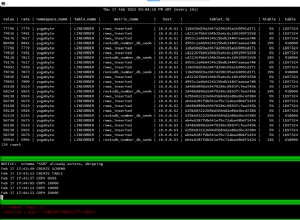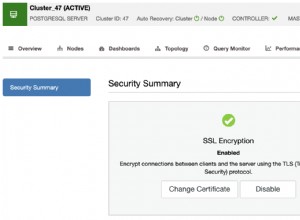Vous trouverez ci-dessous l'extrait de code (presque) complet :
# ... omitted import statements and session configuration
def _date(date_str):
return datetime.strptime(date_str, "%Y-%m-%d")
class Match(Base):
__tablename__ = "match"
match_id = Column(Integer, primary_key=True)
date = Column(Date, nullable=False)
@hybrid_method
def match_count(self, timespan_days):
cut_off = self.date - timedelta(days=timespan_days)
sess = object_session(self)
M = Match
q = (
sess.query(M)
# .filter(M.match_id != self.match_id) # option-1: only other on the same day
.filter(M.match_id < self.match_id) # option-2: only smaller-id on the same day (as in OP)
.filter(M.date <= self.date)
.filter(M.date >= cut_off)
)
return q.count()
@match_count.expression
def match_count(cls, timespan_days):
M = aliased(Match, name="other")
cut_off = cls.date - timespan_days
q = (
select([func.count(M.match_id)])
# .filter(Match.match_id != self.match_id) # option-1: only other on the same day
.where(M.match_id < cls.match_id) # option-2: only smaller-id on the same day (as in OP)
.where(M.date <= cls.date)
.where(M.date >= cut_off)
)
return q.label("match_count")
def test():
Base.metadata.drop_all()
Base.metadata.create_all()
from sys import version_info as py_version
from sqlalchemy import __version__ as sa_version
print(f"PY version={py_version}")
print(f"SA version={sa_version}")
print(f"SA engine={engine.name}")
print("=" * 80)
# 1. test data
matches = [
Match(date=_date("2020-01-01")),
Match(date=_date("2020-01-02")),
Match(date=_date("2020-01-03")),
Match(date=_date("2020-01-05")),
Match(date=_date("2020-01-05")),
Match(date=_date("2020-01-10")),
]
session.add_all(matches)
session.commit()
print("=" * 80)
# 2. test query in "in-memory"
for m in session.query(Match):
print(m, m.match_count(3))
print("=" * 80)
# 3. test query on "SQL"
session.expunge_all()
q = session.query(Match, Match.match_count(3))
for match, match_count in q:
print(match, match_count)
print("=" * 80)
if __name__ == "__main__":
test()
Le code ci-dessus produit la sortie suivante :
============================================================
PY version=sys.version_info(major=3, minor=8, micro=1, releaselevel='final', serial=0)
SA version=1.3.20
SA engine=postgresql
============================================================
<Match(date=datetime.date(2020, 1, 1), match_id=1)> 0
<Match(date=datetime.date(2020, 1, 2), match_id=2)> 1
<Match(date=datetime.date(2020, 1, 3), match_id=3)> 2
<Match(date=datetime.date(2020, 1, 5), match_id=4)> 2
<Match(date=datetime.date(2020, 1, 5), match_id=5)> 3
<Match(date=datetime.date(2020, 1, 10), match_id=6)> 0
============================================================
<Match(date=datetime.date(2020, 1, 1), match_id=1)> 0
<Match(date=datetime.date(2020, 1, 2), match_id=2)> 1
<Match(date=datetime.date(2020, 1, 3), match_id=3)> 2
<Match(date=datetime.date(2020, 1, 5), match_id=4)> 2
<Match(date=datetime.date(2020, 1, 5), match_id=5)> 3
<Match(date=datetime.date(2020, 1, 10), match_id=6)> 0
============================================================
alors que la requête q aimerait comme ci-dessous (en postgresql ):
SELECT match.match_id,
match.date,
(SELECT count(other.match_id) AS count_1
FROM match AS other
WHERE other.match_id < match.match_id
AND other.date <= match.date
AND other.date >= match.date - %(date_1)s) AS match_count
FROM match
Un élément que je voudrais souligner est que la vérification "en mémoire" n'est pas très efficace, car il faut interroger la base de données pour chaque Match exemple. Par conséquent, j'utiliserais la dernière requête si possible.




